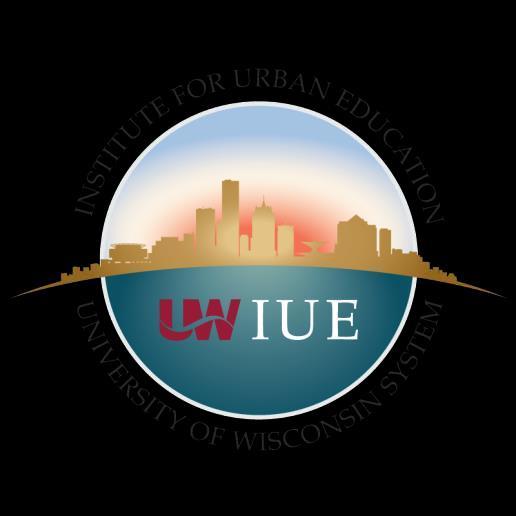








 LEADERS TOMORROW
LEADERS TOMORROW











 LEADERS TOMORROW
LEADERS TOMORROW

This document describes the work of the University of Wisconsin Milwaukee’s Institute for Urban Education (IUE), sponsored by the University of Wisconsin System Administration, from 20182023. Now in its second decade, the IUE focuses on preparing culturally relevant teachers1 for careers in Wisconsin’s urban school districts where educationally marginalized children2 are experiencing critical teacher shortages. The mission of the IUE is to advance the field of urban education by recruiting, retaining, and promoting educators for children attending urban schools. This mission is accomplished through research, professional development, and clinical placement in urban school districts. The IUE serves schools and programs of education on all 13 UW System campuses as well as urban school districts throughout the state with a concentration in Southeastern Wisconsin school districts3 .
The IUE’s work is funded through a grant from the University of Wisconsin-System (UW-System) that has been awarded in five year increments since 2007. The departure of the IUE Director in 2017 stimulated a major program revision in 2018, led by UW System Administration and UW Milwaukee. The most recent award was for the contracted grant cycle of 2018 2023. Although the grant was awarded in 2018, no staff were hired, and no significant activities occurred until 2019 20. A new director was hired in January 2020 to lead the redesigned program, which was fully implemented in Fall 2020 during the COVID 19 pandemic.
This revision recentered the program's three major functions: 1) Engaging in research practice partnerships, 2) supporting the ongoing professional development of pre service and in service teachers, and 3) developing clinical placements in school districts where students experience unequal access to quality teachers. Since reopening, the IUE has accomplished the majority of its annual goals. Highlights include the following:
• Officially established as an institute at UW Milwaukee
• Formed university partnerships with five of the largest urban districts in Wisconsin
• Made clinical placement for 120 education majors from 12 of the 13 UW System campuses4
• Annual pre service and in service professional development for partner districts
• Annual equity conference serving 1000 statewide, national, and international educators
• Research program in literacy and teacher retention to address education disparities
1 The IUE applies Ladson Billings (1995) model of culturally relevant pedagogy to research, professional development, and clinical placement.
2 According to a United Nations Educational Scientific and Cultural Organization (UNESCO) report, “Marginalization in education is a form of acute and persistent disadvantage rooted in underlying social inequalities” (UNESCO, 2010, p. 135).
3 The IUE was charged with forming relationships with districts identified by the Wisconsin Department of Public Instruction (DPI) as having critical teacher shortages. These include the school districts of Milwaukee, Racine, Green Bay, Madison, West Allis West Milwaukee, Waukesha, Janesville, Kenosha, and Beloit. Currently, the IUE places students in four of these districts located in Southeast Wisconsin: Milwaukee, Racine, West Allis West Milwaukee, and Waukesha.
4 Data collected from 2018 2023
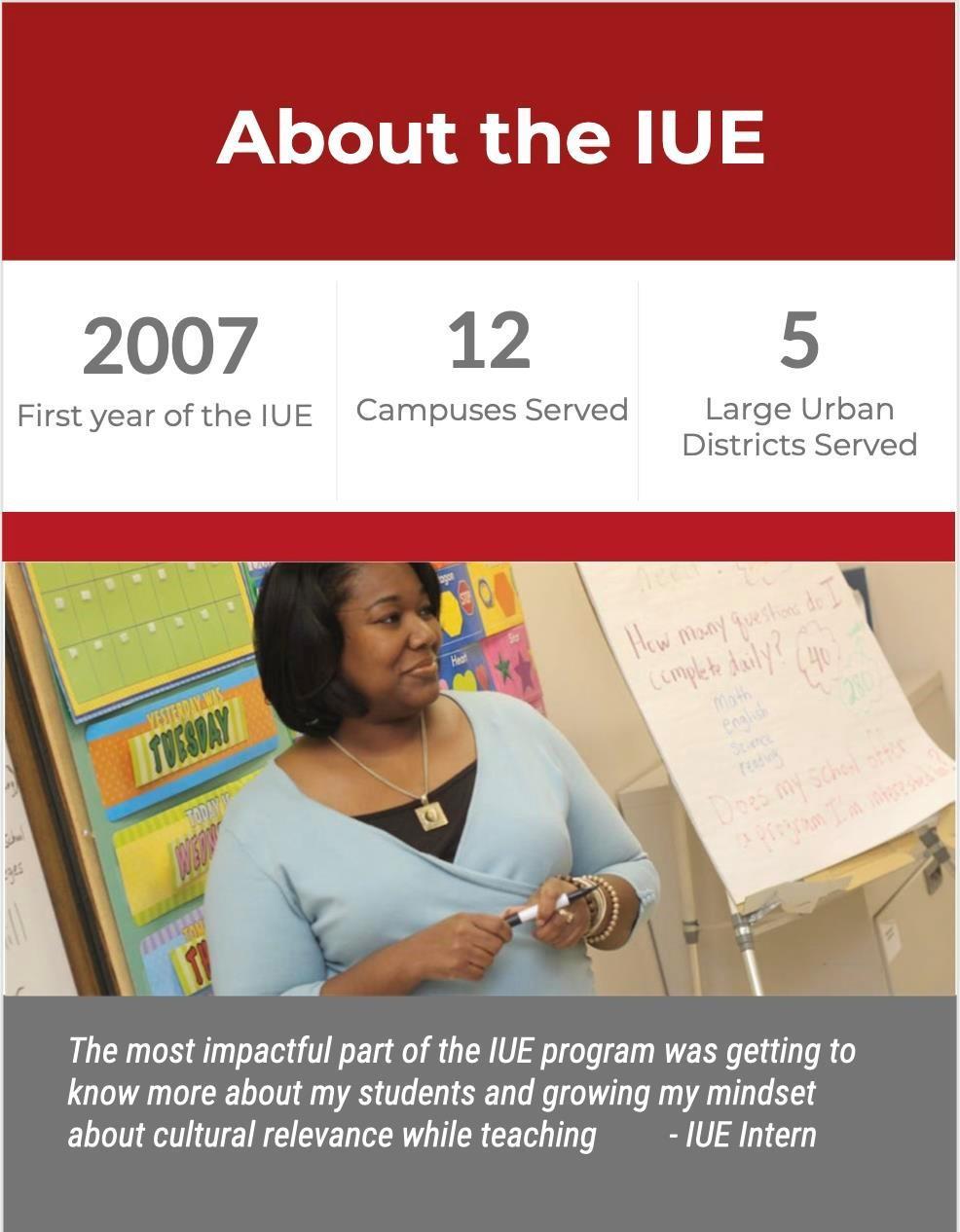
In 2006, in preparation for the UWSA 2007 2009 biennial budget planning, the University of Wisconsin System Administration (UWSA) convened a representative group of Deans and Directors of Schools, Colleges, and Programs of Education from across UW System to identify and discuss the most pressing issues associated with the preparation of PK-12 educators
After numerous discussions about relevant issues, the following priorities were identified as necessary for improving teacher preparation in Wisconsin:
• Enhancing cultural and social competencies for teacher education students
• Recruiting and retaining a diverse student body in teacher education
• Enhancing program capacity to meet the needs of the state (specifically, to increase production of high demand/low supply teacher licensure areas)
• Assessing and evaluating the UW System Teacher Education Programs
To advance these priorities, three specific initiatives were put forward as part of the formal UWSA 2007 2009 biennial budget request to the State of Wisconsin. The UW System Institute for Urban Education (IUE) was one initiative funded by the state and housed in the UW Milwaukee School of Education. The original concept of the IUE was to create a system wide institute that would be “housed” within the UWSA, rather than at an individual UW System institution. This decision was endorsed by the UW System Deans and Directors and UWSA leadership as the best strategy to ensure open access to all UW System education programs and retain a system wide identity. The IUE’s brief history since its inception includes the following:
• From Fall 2007 2012, UWSA was responsible for the administration of the IUE. The administrative “home” for the institute was, ultimately, moved to UWM in Fall 2012.
• From Fall 2012 Spring 2017, the IUE operated with one full time Director and part time staff
• The departure of the IUE Director in 2017 stimulated a major program revision in 2018, led by UW System Administration and UW Milwaukee. At that time, the GUEST program, directed by Amy Gutowski, assumed the responsibilities of clinical placement in MPS until the IUE reopened.
• In 2018, the IUE was redesigned with UWSA’s continued funding and entered its third iteration with a focus on expanding its involvement to include nine urban school districts where students had inequitable access to quality teachers.
Today, the IUE’s revised model better reflects its system wide mission “to advance the field of urban education and to recruit, promote and retain high quality educators for urban districts''. Its mission and vision address gaps in children’s access to quality educators by creating a continuous pipeline of culturally relevant teachers for urban classrooms.
5 Reprinted from Tompkins, F. (2012). The University of Wisconsin Institute for Urban Education: A Brief history and vision for the future.
The mission of the IUE’s research program is to orchestrate collaborative, interdisciplinary research opportunities among UW System colleagues and partner stakeholders with the goal of using research based practices to prepare and develop educators for children attending urban schools. The IUE uses Ladson Billings (1995) model of culturally relevant pedagogy as the framework for its research, professional development, and clinical placement.
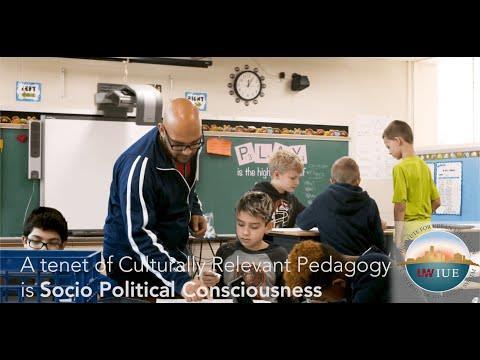
Since 2019, the IUE and its 12 partners have engaged in five research projects; submitted six grants; had eight articles published; presented papers at nine conferences; and disseminated the IUE’s research and advocacy efforts through nine other local, state, and national venues. A list of the IUE’s research and dissemination work is available in Appendix A of this report.





Individual researchers and organizations collaborated with the IUE to conduct research related to urban education. Research partners included school districts, university and campus partners, and university faculty from other centers or programs of urban education.

• Racine Unified School District
• UW Green Bay faculty
• UW La Crosse faculty
• UW Milwaukee faulty
• UW-Madison faculty
• ACCESS Grant UW Milwaukee
• SREeD UW Milwaukee
• Higher Expectations Racine
• Wisconsin Urban Leadership Institute
• Rutgers University
• Pennsylvania State University
• Columbia University
• Johanna Groene, UWM Urban Education Doctoral Program (2019 2021)

• Jamie Holified, UWM Urban Education Doctoral Program (2021 present)
• Carisa Johnson, UWM Special Education Doctoral Program (2022 present)
• Culturally Relevant Pedagogy (CRP). The IUE sought to develop a research based model of CRP that could be used to work effectively with partner districts. Three consultants were retained to develop research projects and white papers related to the three components of the IUE’s CRP model: LaChan Hannon (Rutgers University) developed the cultural competence component of the model, Jeffrey Hawkins (UW Milwaukee) designed the sociopolitical awareness component, and Kelly Mercorella (Penn State University) designed the academic excellence component of the model.
• Action Research. In 2021 22, the IUE conducted a pilot action research project with 10 teachers from RUSD and WAWM. The purpose of this project was to have a teaching team, consisting of
• a cooperating teacher and an intern, explore one of the three components of culturally relevant pedagogy identified by Gloria Ladson Billings. The teaching teams used the lens of a systemic educational equity issue that was related to themselves, school district, school building, classroom, and/or students. Through their exploration, each team devised a plan to implement changes that would help their teaching team become more culturally relevant educators and improve outcomes for students. Teaching teams were guided through a few mini sessions to support their action research projects. At the end of the semester, the teaching team was asked to present their final action research projects and findings to the group.
• SPACES Affinity Groups: This project creates affinity group spaces for teachers of color to develop as facilitators of culturally responsive practices for educational communities. The primary objective of a Spaces group is to develop collegiality, support, and professional development for group members; support the group’s engagement and outreach with the educational community; and develop leaders of diverse, culturally responsive practice professional learning communities. The secondary objective was to provide space for Black Female Educators in Milwaukee and surrounding areas to incorporate and relate to other educators in relaxing and relatable group spaces. By extending this platform, teachers were equipped to be leaders of culturally responsive teaching practices and empower colleagues to do the same. The program was a 6 week session that will be replicated in Spring 2023.
• Literacy and Social Justice: The mission of the Literacy and Social Justice (LSJ) Project is to increase the number of children in Wisconsin who read proficiently by preparing their teachers to use research based reading instruction. The vision of the LSJ project is that teachers representing the IUE partner school districts will successfully implement effective reading instruction in their classrooms. The IUE sought to accomplish this goal by developing an online system of instruction that teaches educators about effective reading practices. The system is currently being refined for a formal research project to begin in Spring 2023. Additionally, the LSJ project disseminates information about how literacy is a form of social justice for many educationally marginalized PK 12 learners.
• The Impact of Interruption during the COVID-19 Pandemic. This dissertation project conducted by IUE Graduate Research Assistant, Johanna Groene was a qualitative analysis of barriers and solutions to literacy instruction from K 8 teachers who used reading instructional methods with elementary and middle school students during the COVID-19 pandemic of 2020 and 2021.
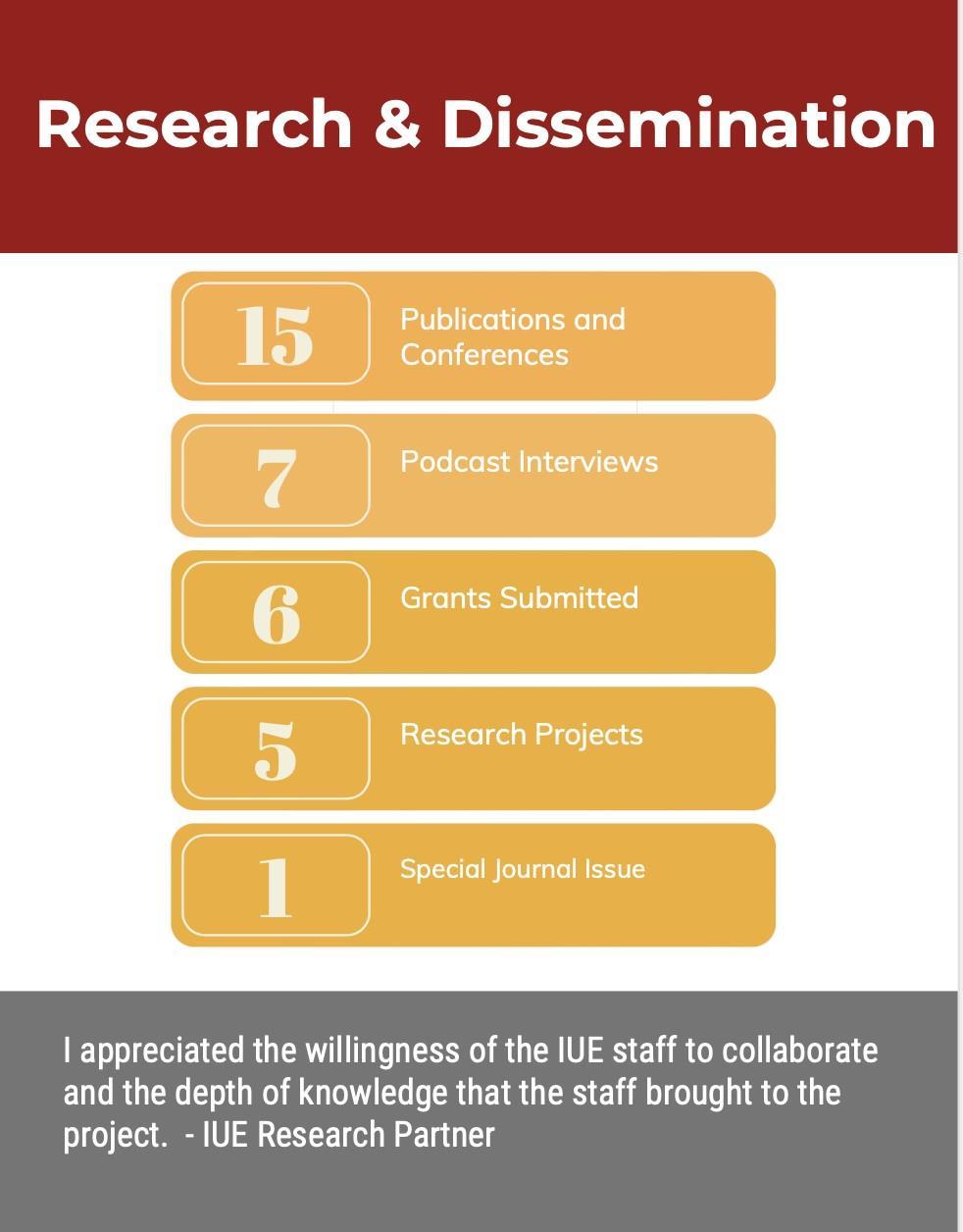
The mission of the IUE’s professional development program is to foster culturally responsive teaching practices for educators from urban districts across the state and for other districts serving educationally marginalized students. The vision of the program is that the experiences of educationally marginalized students across Wisconsin will be positively affected by educators’ growth in culturally relevant teaching practices. This mission and vision are accomplished through 1) onboarding of cooperating teachers and school administrators, 2) statewide annual equity conferences for education professionals, and 3) coursework and continuing education in culturally relevant pedagogy.
Each semester, the IUE holds an onboarding session for cooperating teachers and administrators who will support IUE teacher candidates. The onboarding session informs students and administrators of the logistical and contractual aspects of participating in the IUE with their partner school district. It also provides a foundational training on culturally relevant pedagogy (CRP), which enables students to enter their practicum with a knowledge base about CRP.
The first onboarding session, held in August 2020, was a 5 day series in which participating teacher candidates and their cooperating teachers used daily morning professional development sessions to learn research based teaching practices, engage in collaborative planning, and examine student data

with the goal of applying culturally relevant practices to their schools and classrooms. The next school year, the morning professional development component was revised based on the following feedback from IUE interns and their cooperating teachers:
• Since IUE interns attend eight (8) mandatory CRP cohort sessions throughout the semester, the week long PDA was too lengthy for cooperating teachers and interns
• The PDA was competing with the school district’s mandated professional development that occurred each year in the weeks leading up to the start of school

• Facilitating a 5-day academy would be difficult to replicate in the spring semester since cooperating teachers would be teaching full time
• Due to the COVID 19 pandemic, there was no opportunity to practice CRP with students because of restrictions placed on face to face interactions
Subsequent onboarding sessions were consolidated to 2 hour sessions and expanded to include administrators as well as cooperating teachers and students. The onboarding included the following topics:
• Overview of the IUE
• Culturally relevant teaching practices
• Best practices for observations and feedback for interns
• Problem solving and having hard conversations
• Expectations of cooperating teachers and others supporting the teacher candidates
The IUE has held three virtual annual equity conferences since 2020. Each of the conferences has focused on an important and relevant issue related to bias and culturally relevant teaching practices. The conferences have been highly attended and recordings are made openly available on the IUE’s YouTube channel and its UWM webpage.
• Fall 2020 - Culturally Relevant Pedagogy: Education in the 21st Century. Speakers included Gloria Ladson Billings (UW Madison), a parent and student panel (Racine Unified School District), Andre Bennett (Racine Unified School District), Denise Ross Page (Institute for Urban Education), and Reggie Jackson (Nurturing Diversity).
• Fall 2021 - Walking in Our Shoes: Understanding the Perspectives of Teachers of Color. Keynote speaker, Dr. Lynnette Mawhinney (Rutgers University), and a group of educators who represented teachers of color.
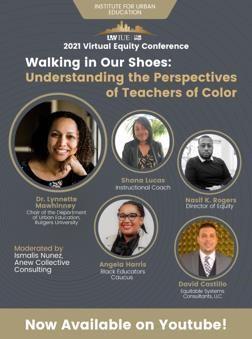
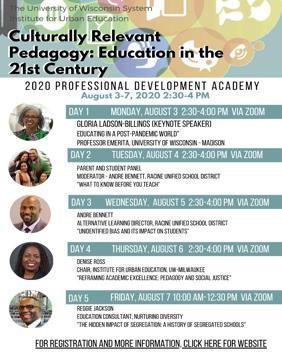
• Fall 2022 Unconscious Bias: Knowing What You Don’t Know. The keynote speaker was Milwaukee County Municipal Judge Derek Mosely. 2020 2021 2022

• Professional Development Series. During the 2021 22 academic year, the IUE developed a 3 part Professional Development School Year Series “Amplifying Voices: Speaking Up and Speaking Out forChildren”.Theseries was designed to shareinsights about educational disparities from the perspective of educators and families affected by them. The series was created to share on demand with school districts, higher education classes, and individuals needing continuing education credits. Each session was approximately 1 hour and was supported by a facilitator’s guide that could be used independently or in conjunction with a facilitator from the IUE. All sessions, which were pre recorded as panel discussions and first offered in the 2022 23 school year, presented perspectives on disparities in urban education including:
• Disparities in Special Education: This session discussed inconsistencies and damaging effects of special education referrals, qualifications, and provision of services for students of color including the underrepresentation of students of color who truly need special services and overrepresentation of students of color with perceived behavior issues in special education
• Disparities in School Discipline: This session discussed the impact of inequities in classroom and school district discipline including disproportionate disciplinary actions that target Black students as well as the effects of Zero Tolerance policies implemented in the 1980s and 1990s.
• Literacy and Social Justice: This session discussed the need for equitable practices in reading instruction including increasing literacy for students from diverse racial and ethnic groups in Wisconsin and discussions about how reading is a form of social justice for educationally marginalized communities.
• Future School Year Series: In 2023 24, the school year series will include additional sessions on gifted education, student stories, reading instruction, and STEM. Sessions will be monetized, marketed, and distributed with the goal of increasing revenue to supplement IUE student fees for supervision.
• Second Certification in Special Education. In2019,the IUEExecutiveCommitteevotedto have the IUE develop a second certification in special education as part of its overall mission and vision to impact high need and critical teacher shortages. However, a survey of and discussion with faculty from most UW System Special Education Programs suggested that developing a new program was not useful because the existing programs were sufficient. Instead, sharing information with IUE teacher candidates about the need for special education teachers and the availability of existing programs would be more helpful. Based on this feedback, the IUE engaged in the following activities to promote special education teaching opportunities in urban school districts:
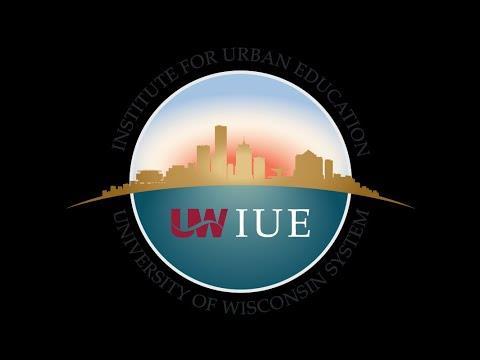
• Convened a committee of special education faculty from UWM, UW Oshkosh, UWParkside, and UW Stout to plan and implement outreach activities related to special education teacher candidates
• Developed and taught a graduate level course for UW Oshkosh that focused on culturally relevant teaching in special education in Summer 2022
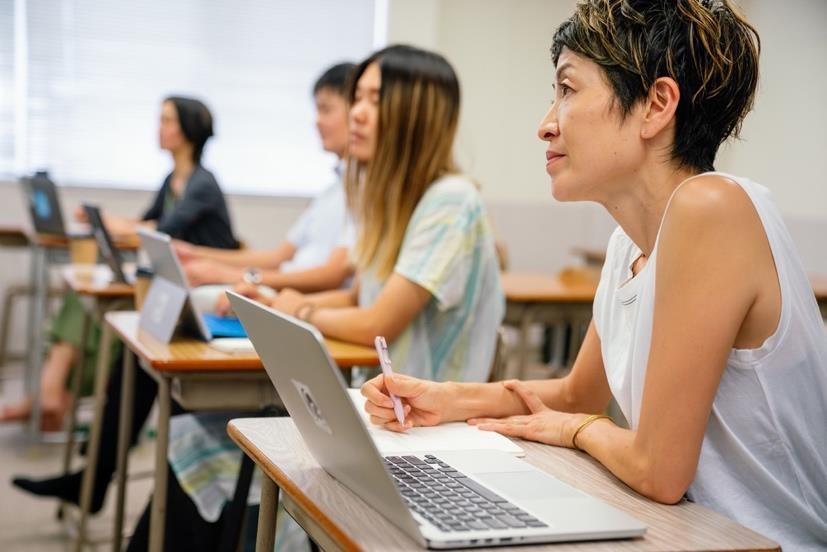
• Discussed disparities in special education and the special education offerings at UWOshkosh and the IUE with high school students at the 2022 Wisconsin Educators Rising Conference
• Recruited special education and ESL teacher candidates for internships in partner districts
• Graduate Course Development. The IUE Director (Denise Ross) and a Graduate Student Researcher (Jamie Holifield) developed and taught a new course focused on culturally relevant teaching practices for UW Oshkosh special education graduate students. The 4credit course, offered in Summer 2022, was Special Education 775: Inclusion, Equity, and Issues of Disproportionality. The course focused on the consideration of diversity and equity in public education, and how educational leaders can enable schools to address and promote these aspects of their school through the selection and implementation of curriculum, pedagogical practices, and an inclusive climate as well as by the utilization of pupil services staff and community agencies. Eight graduate students attended the course.
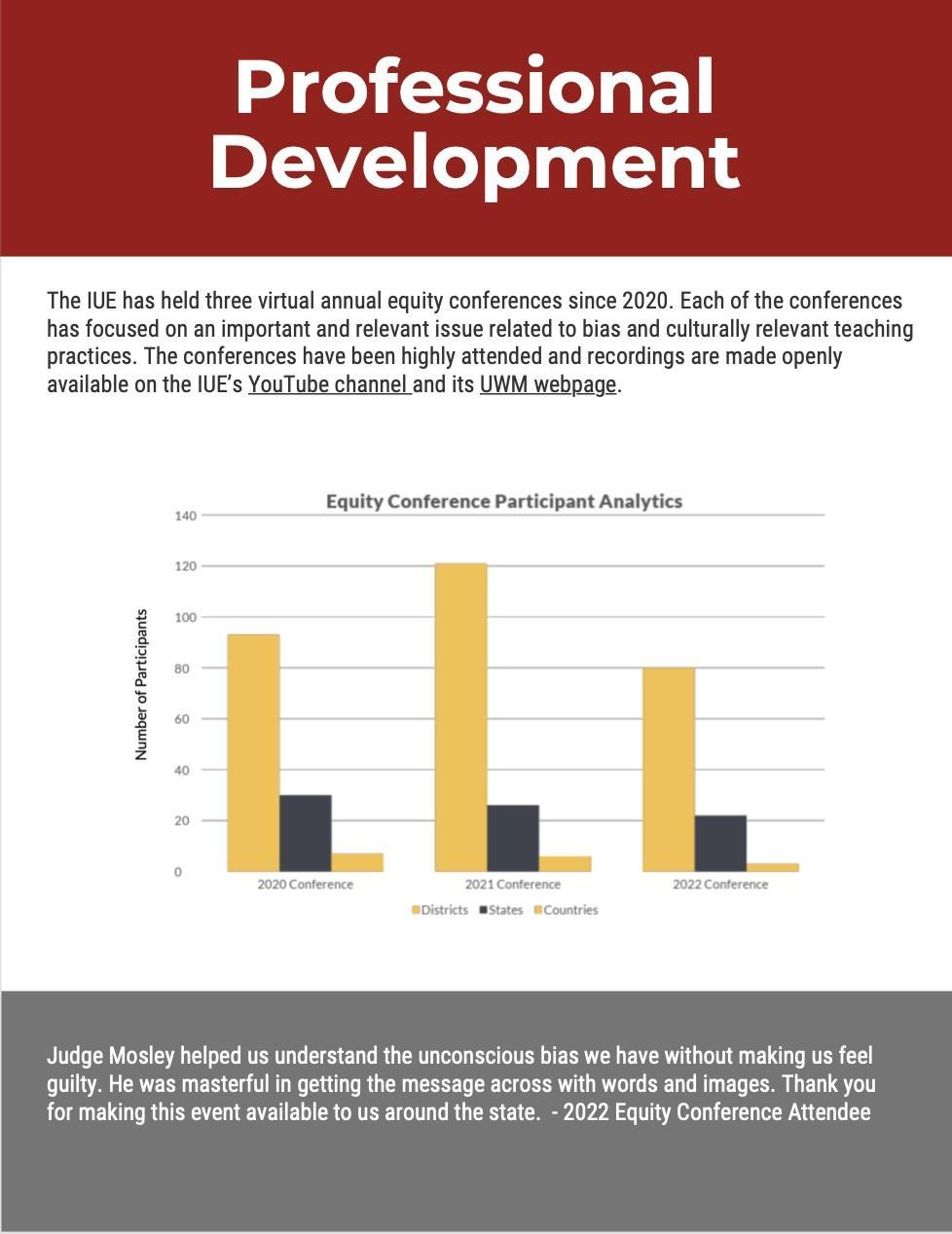
Themissionofthe IUEClinical Placement Program is to provide an urban clinical teaching experience for undergraduate teacher candidates from campuses across UW System. The vision of the IUE Clinical Placement Program is that teacher candidates will be supported as they learn how to teach in urban settings and that, subsequently, they may choose urban districts in their initial teaching placements after graduation. The mission and vision are accomplished through partnerships with school districts in Southeast Wisconsin, student teaching and paid internships, and mentoring.
For a number of reasons, the clinical model proposed to UW System in 2018 differs slightly from the model implemented by the IUE during the last five years. The main reason for the difference is the effect of the COVID 19 global pandemic on education. The pandemic affected everyone in profound ways and the IUE had to revise its plan in order to meet the needs of student teachers and interns who were navigating their clinical placement during the pandemic. Students worked remotely, community events were not held, and teacher candidates and their families were affected by the pandemic. Given these circumstances, the IUE’s revised clinical model currently offers the following:
• Urban teaching clinical placements in four partner school districts in southeastern Wisconsin: Racine Unified School District (RUSD), West Allis West Milwaukee School District
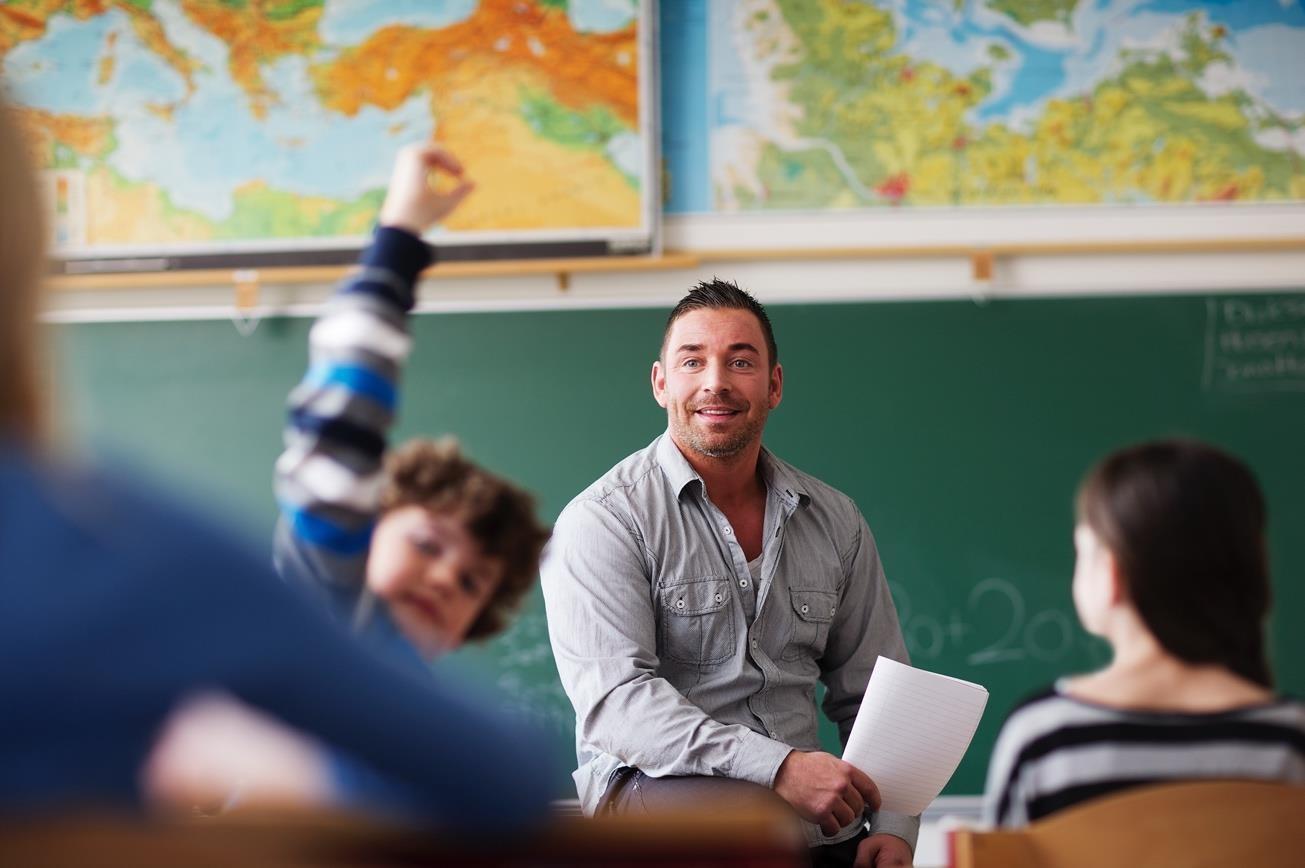
• (WAWM), Waukesha Public School, and Milwaukee Public Schools (MPS)
• Student teaching or WIP internships for students from all UW System campuses • $5000 stipends for interns
• The IUE does not charge its traditional $825 fee to students or campuses for supervising IUE teacher candidates
• Orientation and induction for all candidates prior to beginning clinical placement
• Cohort model with teacher candidates from multiple campuses
• Bi weekly cohort meetings about social justice and culturally relevant pedagogy
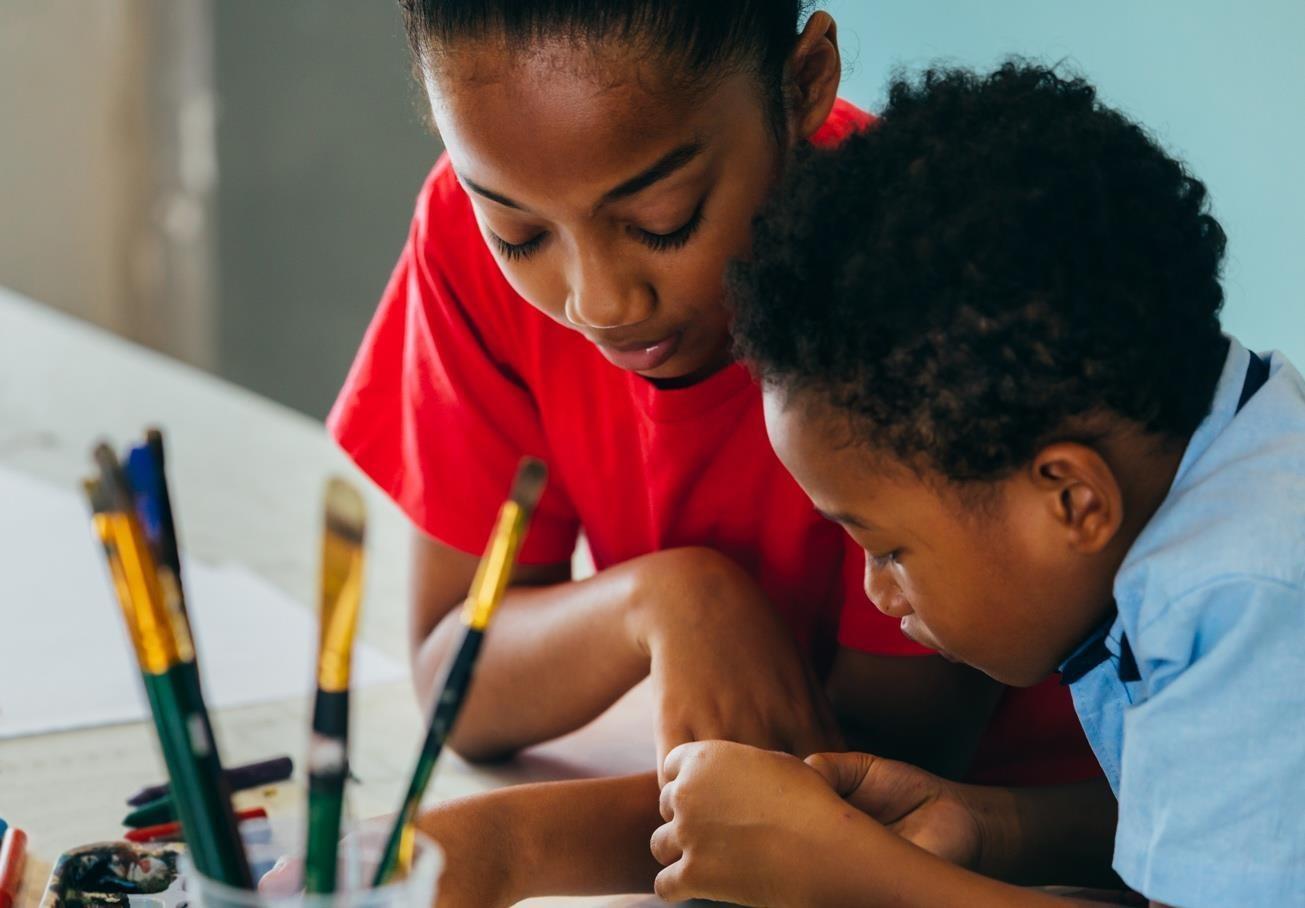
• StrongmentorsupportfromUW affiliatedsupervisors,cooperatingteachers,faculty,andIUEstaff
• Transition supportforemployment in partnerschool districts,including lettersofrecommendation, certificates of completion, and resume writing
• Guaranteed interview for employment with the partner school district after successful completion of clinical placement
The IUE Scholars Program was conducted for one semester in Summer 2020 with the goal of early recruitment of undergraduates interested in becoming teacher candidates. Four undergraduate students from UW Madison and UWM participated in the summer experience and completed projects under the mentorship of the IUE team. Outcomes suggested that the scholars enjoyed the program and would have liked more time to work with their peers.
Data on students’ clinical placements indicates continued interest in the IUE’s student teaching and internship placements. The interest continues despite the effects of the COVID 19 pandemic on the clinical placement experiences of UW System students. In this section, we describe the activities of the IUE’s clinical placement program.
• 2018-19:The IUEoperatedas the GUESTprogram undera federal grant awarded to UWM School of Education faculty. Thirty one student teachers were placed in West Allis West Milwaukee School District, Milwaukee Public Schools, Waukesha Public Schools, and Wauwatosa Public Schools. The GUEST program was operated by a program coordinator in partnership with the UWM Office of Clinical Experience. The GUEST program and the IUE operated simultaneously for one academic year before the IUE absorbed the GUEST program in fall 2020.
• 2019-20: The IUE began its clinical program by approaching two districts about forming university district partnerships with theIUE: KenoshaUnifiedSchool District (KUSD)and Racine Unified School District (RUSD). Due to district priorities, KUSD opted out of the partnership.
• RUSD agreed to a formal partnership with the IUE beginning in the 2020 21 school year. A formal Memorandum of Understanding (MOU) was agreed upon by RUSD, IUE, and UWM. The MOU specified $5000 paid internships for IUE students and described the research and professional development relationship between the IUE and RUSD.
• 2020-21: The IUE’s clinical placement program officially began in the 2020 21 academic year. Interns were recruited from two campuses: UWM and UW Oshkosh. In Fall 2020, six students formed the first cohort of interns in RUSD. Interns were placed in teams of two in three elementary Community Schools in RUSD. In Spring 2021, the IUE merged with the GUEST program and gained additional students for both internship and student teaching positions. One intern from UWMilwaukee had a clinical placement in RUSD and five student teachers and interns from the GUEST program had clinical placements in Waukesha, West Allis West Milwaukee, Milwaukee, and Racine school districts.
• 2021 22: During the 2020 21 school year, the IUE formed a formal university district partnership with West Allis West Milwaukee (WAWM) school district. An MOU between WAWM, UWM, and the IUE specified $5000 paid internships for IUE students and described the research and professional development relationship between the IUE and RUSD. Additionally, in Summer
• 2021, the IUE’s internship program became a Wisconsin Improvement Program (WIP) internship program and all 2021 22 teacher candidates in WAWM were WIP interns. All 2021 22 RUSDIUE teacher candidates became paid student teachers. Twenty one (21) students formed the Fall 2021 cohort. Fourteen (14) students formed the Spring 2022 cohort.
• 2022-23: Twelve (12) students formed the Fall 2022 cohort, and seven (7) students formed the Spring 2023 cohort.
UW Milwaukee Racine
UW La Crosse West Allis West Milwaukee
UW Madison Milwaukee
UW Stevens Point Waukesha
UW Oshkosh Wauwatosa
UW Parkside
UW-Platteville
UW Whitewater
Early childhood education
High school social studies
Grades 1 4 ESL Middle school science
Grades K 5 Middle school science
High school art Middle school special education
High school chemistry Special education cross categorical High school music Special education elementary High school physical education
The IUE clinical placement specialist along with the IUE staff, clinical placement supervisors, campus based clinical placement coordinators, and cooperating teachers provides strategic support for teacher candidates. A critical component of the Institute’s mentoring program is a series of cohort meetings designed to engage candidates in discussions about being culturally relevant educators. Specifically, the IUE requires that all teacher candidates attend eight, bi weekly cohort meetings focused on culturally relevant pedagogy during their semester placement with the IUE. IUE Clinical Specialist Amy Gutowski developed the sequence in order to allow students to have critical conversations in an environment of trust, support, and open communication. The sessions cover multiple topics based on culturally relevant practices as listed below.

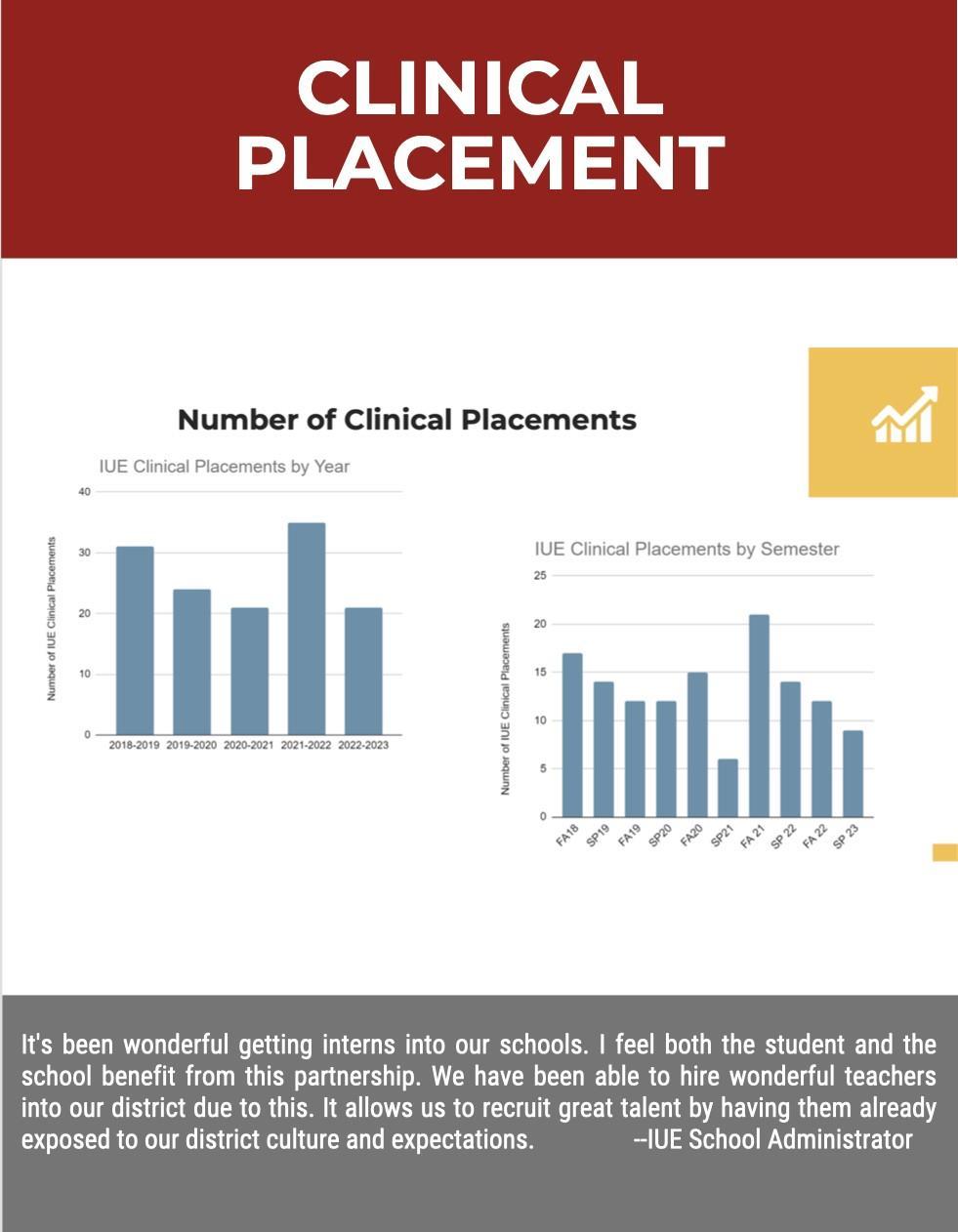
The IUE developed infrastructures to sustain its operations during the current and subsequent grant cycles. The IUE achieved major milestones in the area of operations including:
• Establishing the IUE as an official institute at UW Milwaukee
• Developing a collaborative advisory board composed of UW System Deans, school district leaders, and community leaders from partner districts
• Reallocating funding to eliminate student fees for IUE interns and student teachers
Eachfiscalyear,theInstituteforUrbanEducationreceives$300,000fromUW SystemAdministration (UWSA) to support activities leading to the attainment of its annual goals. The IUE has also received research funding from UWM grants and supplemental funding from the GUEST program, which merged with the IUE in Spring 2021. Finally, in 2022 23, the IUE has arranged to receive compensation from theofferingofour“Amplifying voices: Speaking up and speaking out for children” speaker series for continuing education units and professional development.

Since 2018, the IUE has identified new budget priorities to meet the changing needs of students and partners. They include the following priorities, which are reflected in the Expense Allocation table.
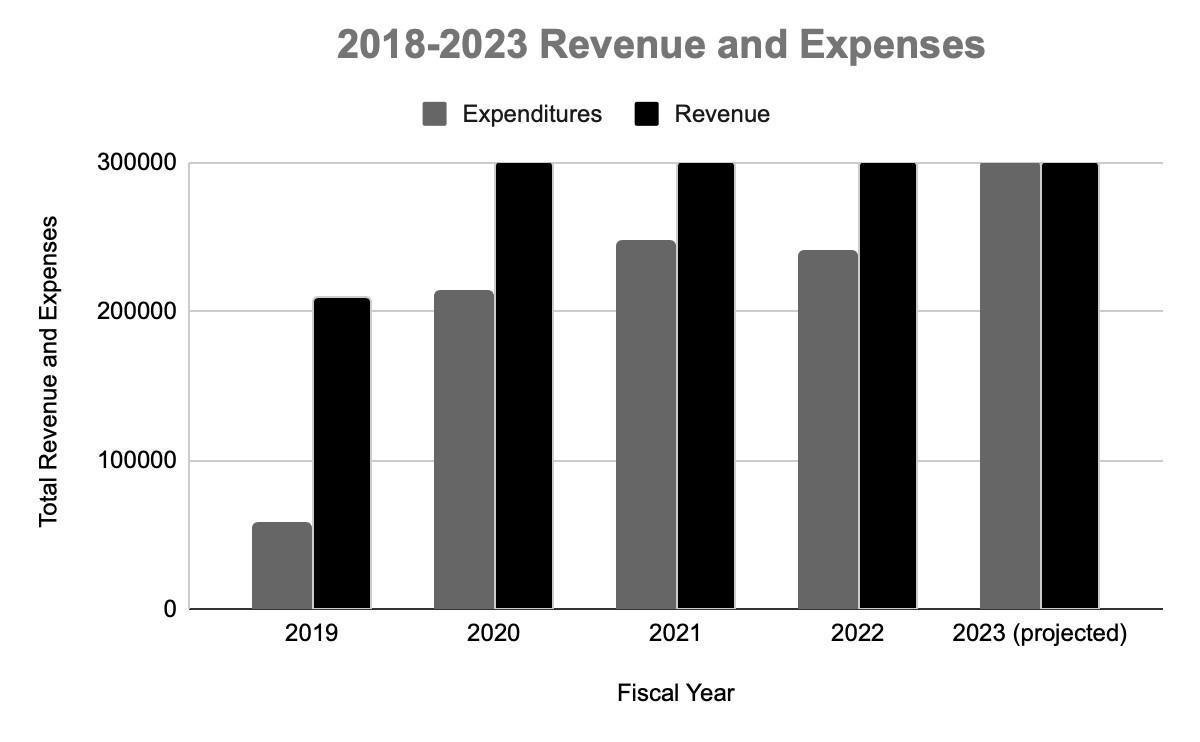
1. In research, the graduate assistantship was divided into two .25 lines to increase the number of graduate assistants available for research projects.
2. In clinical placement, the IUEidentifiedfundingto eliminatesupervision fees forstudents. The IUE also hired a Clinical Specialist.
3. In professional development, the IUE allocated funding to compensate cooperating teachers and administrators for onboarding. 2018-2023
In Spring 2021, the IUE Executive Committee and staff determined that eliminating the $825 fee for teacher candidates was an important goal and identified funding resources to accomplish this goal. Using funds from the GUEST program to compensate supervisors from campuses outside of Southeast Wisconsin, and a model of supervision that allowed campuses in the local area to supervise their own students, the IUE was able to accomplish the following goals:
• Eliminate approximately $9,900 in fees for 12 student teachers (Fall 2020 Spring 2023)
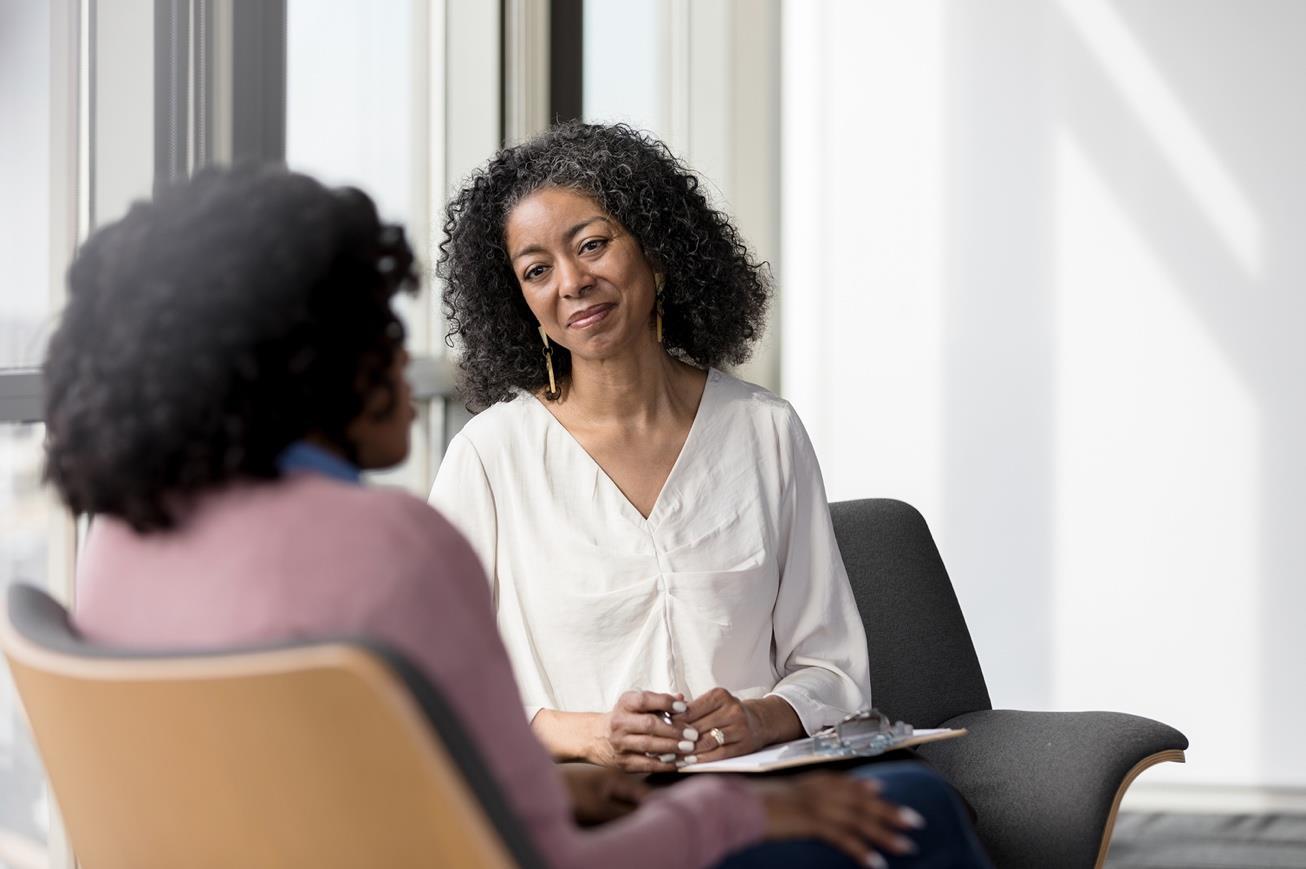
Eliminate approximately $43,125 in fees for 69 interns (Fall 2020 Spring 2023)
•
Since 2020, the IUE has had the following supplemental funding and research grants to assist with supervision and research.
• $15,625 in GUEST funding from the IUE and GUEST merge in Fall 2020
• $47,800 in research funding since Fall 2020
Through relationships with districts and the WIP internship program, IUE teacher candidates have received approximately $285,000 in internship stipends (Fall 2020 Spring 2023).
Since 2020, IUE partners who participated in research, professional development, and clinical placement have provided feedback on surveys and in focus groups or interviews. The evaluation provided below is information from a series of surveys conducted with research partners and participants; conference and professional development participants; and teacher candidates, cooperating teachers, district administrators, and campus clinical coordinators who have participated in the IUE’s clinical placement program.

Two community partners and one graduate student researcher responded to a survey with two open ended questions. When asked to describe positive aspects of their research partnership with the IUE, partner researchers said that they thought the IUE “offered valuable feedback on our own work. Organized and well run IUE advisory meetings”. They also thought the IUE conducted socially relevant research and thought the staff collaborated willingly and brought a “depth of knowledge” to a project. They suggested collaborations across departments.
Feedback from an IUE student who participated in the SPACES Affinity Group Project can be viewed on this link: SPACES Participant Interview
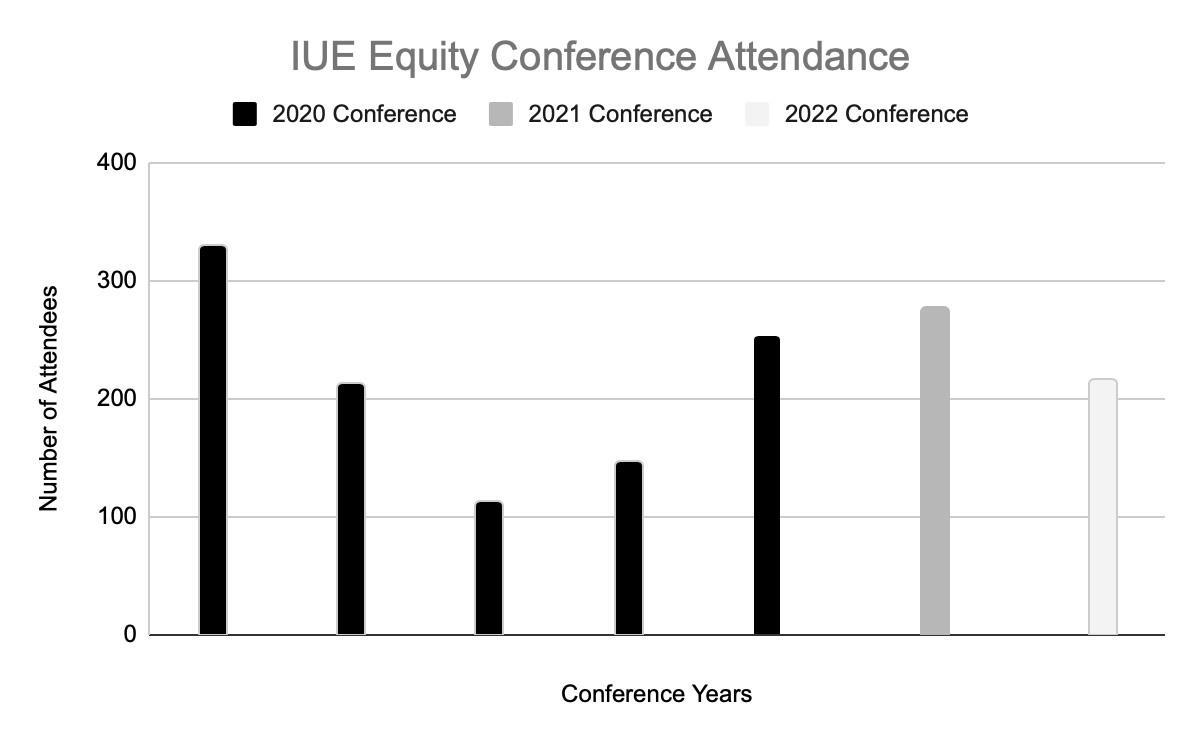
• Districts. 93 districts have participated in the IUE’s Annual Equity Conferences. Some examples of Wisconsin organizations and districts include Racine Unified District with 47 participants and Oshkosh Area School District with 45 participants. In addition to the state of Wisconsin, there are also districts and organizations from around the country that have participated in this PD academy. Some of the organizations and districts that participated outside of Wisconsin were Durand Arkansas School District, Western Michigan University, Teachers College at Columbia University, and Concordia University Edmonton.
• Professions. In addition to university students and teachers, several other professionals have participated in the Annual Equity Conferences including school administrators, university faculty, directors, instructional coaches and interventionists, paraprofessionals, and school counselors.
• States. Attendees from 30 different states including California, Washington, and New Jersey have attended the conference.
• Countries. Individuals from seven different countries including the United States have attended the conference. Countries include the United Kingdom, United Arab Emirates, Canada, Republic of Korea, India, and Ecuador.
Overall, feedback on the equity conferences has been generally positive with 90% of attendees who responded rating the conference as excellent and noting that the conference positively contributed to their professional practice. Conference attendees from each year stated the following:
• “Really enjoyed the cultural activities that we learned, especially the activity when we had to present our names and what origin they were from as well as family nationality. I found this as an activity that I could use with my own students. I also enjoyed learning about playlists, and this is also something that I will be using in the future. I enjoyed all the
afternoonpresentations, but Iespecially enjoyedthepresenters GloriaLadson Billings, and Andre Bennet.” (2020 Equity Conference Attendee)
• “The panel was incredible, and I felt the discussion flowed well, so I feel there is little to be improved with the format. The message can always be amplified. I heard about this through word of mouth and there may be ways to advertise more widely through the education networks.” (2021 Equity Conference Attendee)
• “Judge Mosley helped us understand the unconscious bias we have without making us feel guilty. He was masterful in getting the message across with words and images. Thank you for making this event available to us around the state.” (2022 Equity Conference Attendee)
Feedback on the onboarding process has been generally positive. Notable comments from the post onboarding survey conducted in 2022 included the following statements:
• “Very informational on what to expect during the semester.”
• “It was nice to see what the program was going to be focusing on, and the examples of observations and good feedback.”
• “Discussing the different elements of feedback as well as the different tools the intern will be using gave me some insight on what I need to focus on.”
• “The suggestions for how to do observations, giving feedback, and how to have hard conversations are all very helpful.”
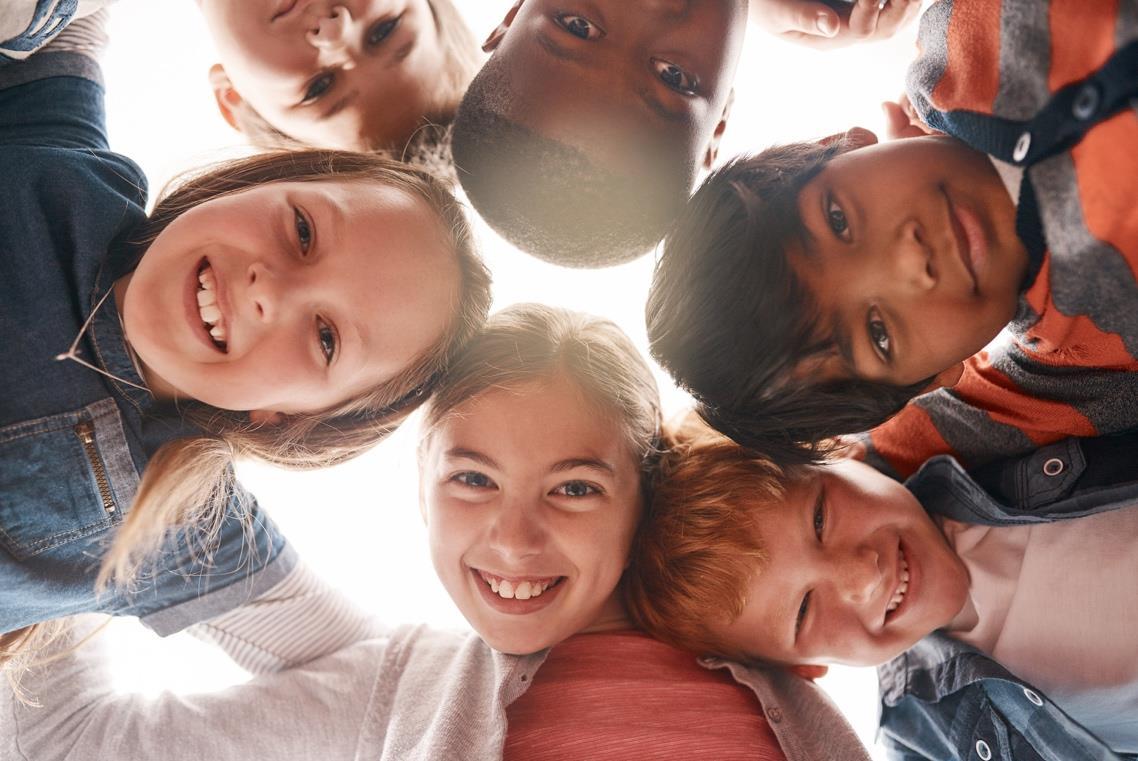
(n=38)
Each semester, teacher candidates are asked to describe their experiences as student teachers or interns in the IUE program. 38 students have responded since Fall 2020. Teacher candidates were asked three questions: 1) What was the most impactful part of the program? 2) What was the most challenging part of the program? 3) What suggestions do you have for improvement?
What was the most impactful part of the program? Teacher candidates had four major responses to this question: 1) working with students in urban communities; 2) mentoring from Amy Gutowski, the IUE Clinical Specialist; 3) support from the program and peers; and 4) different and diverse experiences.
• Working with students in urban communities. First, teacher candidates thought that working with their K 12 students was one of the most impactful parts of their experience with the IUE. They specifically valued working with students in urban communities, advocating for their students, learning more about them, and learning how systems impacted their students. For instance, one student said that they valued “learning about the prison pipeline system. Until we talked about it, I didn't realize how much it affects our students.”
• Clinical Specialist, Amy Gutowski. Teacher candidates noted that they valued the support, articles and information, opportunities for advocating, and passion about the subject matter that they received from Amy as a mentor. One teacher candidate stated, “This semester was definitely eye opening and impactful on who I am as a person and who I am as a teacher. My views on many thingshavechangedforthebetterand I'mexcitedtousewhatIhavelearnedinmyownclassroom.”
• Support from their program and peers.Teachercandidatesnotedthattheirsupervisors,theClinical Specialist Amy Gutowski, their peers, and the bi weekly seminars offered support. Students also said that this support was particularly important during the COVID 19 pandemic. One teacher candidatestated that,“Thesupportthatthis program andmy peershavegivenmeduringthis whole semester has been above and beyond what I expected. It was definitely the most impactful part of being an IUE intern.”
What was the most challenging part of the program? Teacher candidates identified three major challenges: 1) issues related to their students, 2) issues related to their teaching environments, and 3) the schedule of IUE meetings.
• Issues related to their teaching environments. The first semester of clinical placement took place during the COVID 19 pandemic in Fall 2020. Most teacher candidates’ responses reflected the impact that the COVID pandemic restrictions had on their clinical teaching experience. Specifically, students said that teaching virtually, team teaching, and teaching large class sizes was challenging.
• Issues related to scheduling and workload. While students greatly appreciated cohort meetings, they also noted that attending cohort meetings after long teaching days was challenging at times. They felt that adding specific activities such as readings and action research to their academic activities was challenging as well.
• Issues related to their students. Teacher candidates noted that the lives of their students felt challenging to them. Issues such as high absenteeism, “baggage” that students bring with them from their lives outside of school, behaviors of their students, and the involvement level of parents. Support was important as they experienced these issues. One teacher candidate said, “I loved getting to get together every other Tuesday and talk with peers who were going through the same/ similar things that I was.”
What suggestions do teacher candidates have for improvement? Most students said that they highly valued the program and that it was a very impactful experience that prepared them for teaching. However, some students also had some suggestions for improvement. For instance, one teacher candidate suggested that it would be helpful to have assistance with housing and more fun activities for students who move to the area. Another teacher candidate recommended placing students in licensure groups while another suggested that students should have an opportunity to observe their peers.
Clinical Placement Program Administrator Feedback (n=6) School building principals and district administrators were asked to comment on their experience with hostingIUEinternsbyrespondingtothefollowing questions:1)Whathavebeensomepositiveaspects and benefits of hosting an IUE intern in your school, 2) What recommendations would you suggest for improving the IUE experience for partner schools and interns in our next iteration (2023 2028)?
What have been some positive aspects and benefits of hosting an IUE intern in your school? Administrators said that the students (teacher candidates) were the strength of the program. They indicated that they liked having additional adults in the building who were “hard working and independent” and thought that the interns were able to help meet the individual needs of the children and were “useful to the students.” They also indicated that the students’ presence “provided the opportunity to share great strategies, support students with additional support in the classroom and recruit new teachers”.
WhatrecommendationswouldyousuggestforimprovingtheIUEexperienceforpartnerschools and interns in our next iteration (2023 2028)? Administrators provided two suggestions: 1) letting interns meet needs for more teachers including substitute and regular teachers and 2) sharing feedback about candidates’ experiences at the school. One administrator commented that the IUE “somehow allow interns to be able to sub in the classroom they are interning. Such a shortage of subs in general”. Another commented that their “only need is to recruit more candidates”. Another administrator requested “continued communication about eligible candidates”.
Feedback (n=8)
University and community partners were asked to provide feedback on their experiences with the IUE. Partners included school districts, UW System Educator Preparation Programs (EPP), community organizations, and clinical supervisors. IUE partners were given a survey and one open ended question. Seven partners responded: 4 from UW-System EPPs, one school district administrator, one clinical supervisor, and one university supervisor.
• 100% of partners strongly agreed that they were satisfied with their partnership with the IUE, that the IUE was accessible and responsive to their questions and concerns, and that the IUE provides experiences they need to become effective educators.

• When asked for additional feedback, IUE partners described the IUE as supportive, collaborative, and responsive. One partner suggested that “The only challenge is to have all students receive the same type of student teaching experience. Being place at a high performing versus a struggling school can give students a totally different experience”.
Clinical Program Evaluation Cooperating Teacher Feedback (n=8)
Fall 2022 cooperating teachers were asked to provide feedback on a brief two question survey about their current experiences as cooperating teachers. Eight teachers responded.
• When asked how they rate their experience as a cooperating teacher, six teachers rated it as excellent, and two teachers rated it as either fair or good.
• When asked to provide additional details about their rating, the teachers gave positive comments about the interns, stating that they were “wonderful,” “doing an incredible job,” were “well planned,” “makes great connections with students,” and “came up with fresh ideas on teaching”. One teacher noted that she wanted her intern to take more initiative in leading the class, but also stated that the intern was a good teacher who planned lessons well.
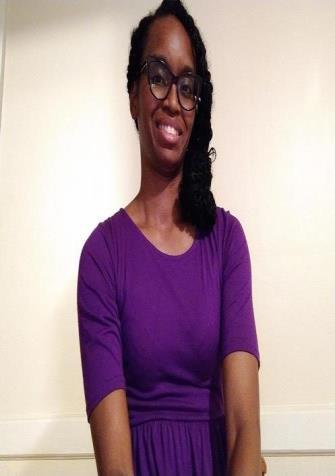
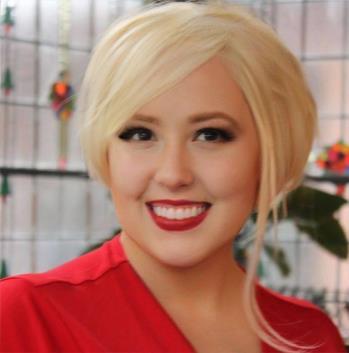
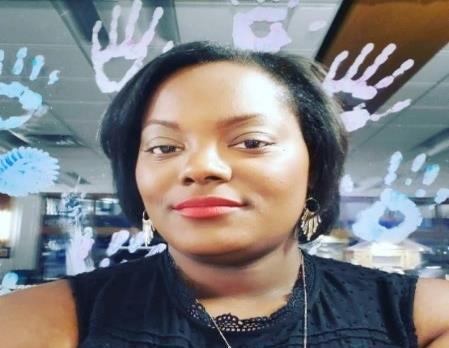
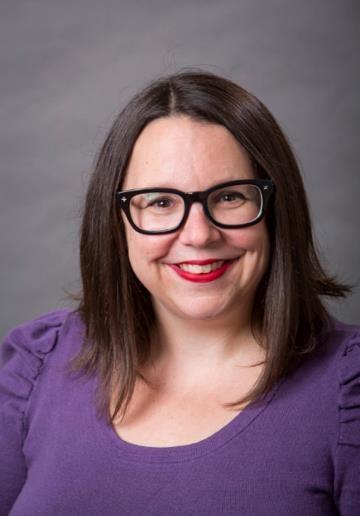
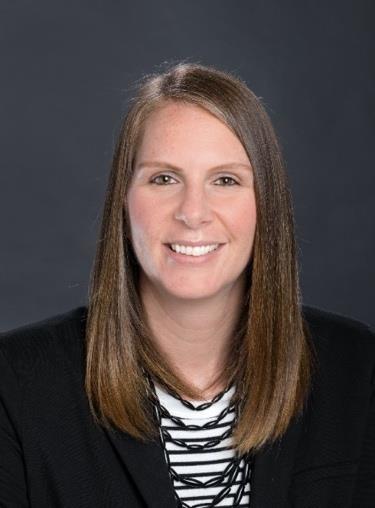

Barbara Bales University of Wisconsin System
Deidre Roemer West Allis West Milwaukee School District
Denise Ross Page Institute for Urban Education
Francisco Sanchez Milwaukee Community Schools/United Way
Lana L. Collet Klingenberg University of Wisconsin Whitewater
Marcie Wycoff Horn University of Wisconsin - La Crosse
Melissa Abel Racine Unified School District
Melissa Cherney West Allis West Milwaukee School District
Hope Longwell Grice University of Wisconsin Milwaukee
Scott Ashman University of Wisconsin Green Bay
Pastor Melvin Hargrove Racine, WI
Cathy Manthei West Allis, WI
Phillip Rhymes Racine Unified School District
Marcie Wycoff Horn University of Wisconsin -La Crosse
Jennifer Kammerud Wisconsin Department of Public Instruction
David DeGuire, Wisconsin Department of Public Instruction
Robin Fox, UW Whitewater
Ryan Hurley, United Way
Auntavia Jackson, Racine, WI
Peggy James, UW Parkside
Kimber Wilkerson, UW Madison
• Hammond, S., Hugh Pennie, A., & Ross Page, D. (in press). Collaborating with schools and communities. In D. Ross-Page & R.D. Greer (Eds). When Text Speaks: Learning to Read & Reading to Learn. Sloan.
• Uwayo, M., Johnson, G., D’Arms, A., Hernandez, M., & Ross Page, D. (in press). Teaching middle schoolers and adolescents to textually respond. In D. Ross Page & R.D. Greer (Eds). When Text Speaks: Learning to Read & Reading to Learn. Sloan.
• Juntunen, C. L., Pietrantonio, K. R., Hirsch, J. K., Greig, A., Thompson, M. N., Ross, D., & Peterman, A. H. (2022). Guidelines for psychological practice for people with lowincome and economic marginalization: Executive summary. American Psychologist, o 77(2), 291 303. https://doi.apa.org/doi/10.1037/amp0000826
• Hugh Pennie, A.K., Hernandez, M., Uwayo, M, Johnson, G., & Ross, D. (2021). Culturally relevant pedagogy and applied behavior analysis: Addressing educational disparities in PK 12 schools. Behavior Analysis in Practice. https://doi.org/10.1007/s40617 021 00655 8
• Uwayo, M., Hernandez, M., & Ross, D. (2021). Income inequality: Understanding the needs of economically disadvantaged children and families. In J. Sadavoy & K. Zube (Eds.). A Framework for Compassion and Social Justice: Lessons in Applied Behavior Analysis. Routledge
• Damashek, A., Ross, D., Corliss, M., Uwayo, M., & Westine, C. (2020). Treatment and prevention approaches for economically disadvantaged young children: challenges and opportunities. Early Child Development and Care. 10.1080/03004430.2020.1794859
• Porterfield, L., Nix, T., Cançado, L., Linneman, N. (2019). Advancing the field of urban education: recruiting, promoting and retaining high quality educators for urban districts. opportunities and challenges in teacher recruitment and retention (Eds. Rinke, C., and Mawhinney, L.). Information Age Publishing
• Gutowski, A., Litzsey, L., & Ross Page, D. (accepted). University district partnerships: Addressing critical teacher shortage. Association of Teacher Education. Jacksonville, FL.
• Litzsey, L., Gutowski, A., & Ross Page, D. (submitted). Recruiting and supporting preservice teachers for urban school districts.
• Ross Page, D. (2023). Literacy and social justice: The importance of reading in the fight for educational equity. Invited paper presentation. Annual Meeting of the Association for Behavior Analysis International. Denver, CO
• Ross Page, D., Moutry, A., & Mawhinney, L. (2022). Supporting the mental health of teachers of color: The impact of collective spaces and affinity groups. Panel discussion. Annual Meeting of the American Psychological Association. Minneapolis, MN.
• Ross Page, D., Hernandez, M., Uwayo, M., & Hugh Pennie, A. (2022). Literacy as social justice: Reading instruction and culturally relevant practices. Workshop presentation. Black Applied Behavior Analysts Conference. Detroit, MI.
• Groene, J. (2021). Impact of interruption: Barriers to literacy instruction during the pandemic. Symposium presentation at the conference of the American Educational Research Association [Virtual Presentation]
• Ross, D. (2021). Literacy as social justice: How behavior analysis can empower struggling readers. Paper presentation. Wisconsin Association for Behavior Analysis. (Virtual Conference).
• Ross, D. (2020). Reframing academic excellence: Pedagogy and social justice. Paper presentation. 2020 Virtual Equity Conference. Institute for Urban Education. University of Wisconsin Milwaukee. https://www.youtube.com/watch?v=45qSysctkTA
• Ross Page, D. (2022). Women’s Giving Circle. University of Wisconsin Milwaukee. Funded: $3000.
• Ross, D.E. (2021). Literacy as social justice. Research Assistance Fund Grant. University of Wisconsin Milwaukee. Funded: $4799.
• Ross, D.E., Antandare, D., & Fields, L. (2020). SPACES: Affinity Groups for Teachers of Color. Award from ACCESS (Asset Based Cultural Competency Ensuring Student Success) a U.S. Department of Education Supporting Effective Educator Development (SEED) grant, PI Leanne M. Evans. UW Milwaukee Funded: $43,000.
• Ross, D.E., Hannon, L., & Drame, E. (2021). Privileging Black parent voices through culturally responsive parent engagement. Russell Sage Foundation. Letter of intent submitted and not accepted: $50,000.
• Pasternak, D.L, Evans, L.M., & Ross, D. (2021). University of Wisconsin Milwaukee/Milwaukee Public Schools Asset Based Cultural Competence Ensuring Student Success (ACCESS). United States Department of Education Supporting Effective Educator Development Grant Program. Submitted and unfunded: $3,444,000.
• Jozwik, S., & Ross, D. (2020).The Strategic Science of Teaching: A Systems Based Approach to Reading Instruction. UWM Discovery and Innovation Grant. Submitted and unfunded: $50,000
• Ross Page, D., Hammond, S., Cartledge, G., & Howard, J. (Guest Editors). (forthcoming). Literacy and social justice: Contributions of the science of behavior to reading instruction. Behavior and Social Issues [Special Issue].
• Jones, C. & Ross Page, D. (2022). Retaining high quality teachers in our schools. [podcast] Building educator capacity with CESA 2. Cooperative Education Service Agency 2, 2022. https://open.spotify.com/episode/6zeXcqaSpRQ4TIYkiSgEeR
• Hernandez, M., Uwayo, M., & Ross, D. (September 3, 2021). Run me my money: Income inequality [podcast] Shades of ABA. https://podcasts.apple.com/us/podcast/run-me-mymoneyincome inequality/id1501568747?i=1000534229839
• Ross Page, D., & Greer, R.D. (October 12, 2022). ABA and Literacy Skills. [podcast] ABA Inside Track. https://www.abainsidetrack.com/home/2022/10/12/episode 218 aba andliteracy
• Ross, D. (July 7, 2021). Thought Leaders, Episode 22. Thought Leaders [Podcast]. https://open.spotify.com/episode/7eJvkOrihIURwqyUabsrxo?si=CdBh1TulT0ucgPAMBBFp -w
• Ross, D. (June 2, 2021). Thought Leaders, Episode 21. Thought Leaders [Podcast]. https://anchor.fm/operantinnovations/episodes/Thought Leaders 021 Dr Denise Ross Part 1 e121o5o/a a5opt0h
• Ross, D. (May 2, 2021). Address the system with Denise Ross and Abigail Twyman. [podcast] Beautiful Humans: The Social Change Cast. https://anchor.fm/beautifulhumans/episodes/Ep 34 Address the System with Denise Ross and Abigail Twymanetcelk/a a51ibvs
• Ross, D. (February 25, 2021) Fidelity at The Forefront: The Fight for Ethnic Studies [Documentary by Taunya Jaco] https://youtu.be/BF6sKe9S8T4?t=1939
• Quirk, K. (Spring 2020). IUE returns to UWM. UWM Edline (p. 13). https://issuu.com/uwmilwaukee/docs/soe_edline_2020_singlepgs .
1Ladson Billings, G. (1995). Toward a theory of culturally relevant pedagogy. American Educational Research Journal, 32, 465 491.
2Global Education Monitoring Report Team (2010). Reaching the marginalized: EFA global monitoring report, 2010. United Nations Education, Scientific, and Cultural Organization (UNESCO). Oxford University Press. https://unesdoc.unesco.org/ark:/48223/pf0000186606
Institute for Urban Education E 2400 . Hartford Ave 566 Enderis Hall Milwaukee, WI 53211 (414) 229-2240



iue-info@uwm.edu https://uwm.edu/education/institute-urba -edu/

